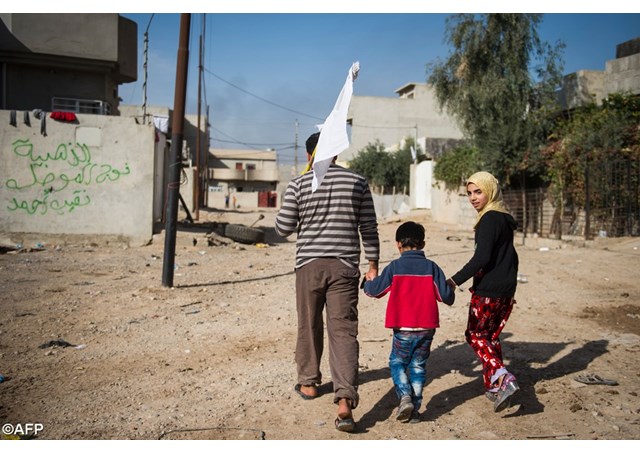
Humanitarian agencies call for protection of civilians in Mosul

(Vatican Radio) Innocent civilians in the embattled city of Mosul are being caught in the crossfire and isolated from the outside world. The Norwegian Refugee Council (NRC) in Iraq is calling for greater protection of civilians trapped inside of Mosul. Since the military offensive began on October 17th to recapture city from ISIS, more than 50,000 people have fled. The number of displaced civilians has increased drastically over the past week, totaling more than 20,000 compared to just 6,000 the previous week.
More than 1 million civilians are at risk of being affected by ongoing military operations, and many are being caught in the crossfire. Some people have not eaten in days and are too afraid to leave their homes. As a result, at least 700,000 people are likely to need urgent assistance in the forms of shelter, food, water, and medical support. In July of 2016, the humanitarian community launched the Mosul emergency appeal for US$284 million but only 64% has been received to date.
Michelle Delaney, the Media Advisor for the Norwegian Refugee Council in Iraq spoke with Vatican Radio’s Linda Bordoni about the pressing situation in Mosul.
Listen:
Although more than 50,000 people have fled Mosul so far, there are still 1.2 million civilians still trapped in the city. Delaney explains, “The numbers we were expecting to see fleeing the city are actually quite low, so we are highly concerned about the people still inside and why they haven’t started to flee.”
There are reports of people being injured or killed by land mines and snipers, as well as being used as human shields: “This is against international humanitarian law and this would be using innocent civilians as weapons of war, which is something that even in the rules of war, you are not supposed to do,” says Delaney.
The NRC in Iraq is calling for the safe passage of civilians in order to get out of the city. In some cases, Iraqi forces are attempting to help civilians escape but cannot get close enough to where the people are located. The civilians still have to move through sniper zones to reach the Iraqi forces. This makes it extremely difficult for people to decide whether to stay or go.
Civilians are afraid to speak out publicly about their ordeals: “When we ask them if we can take a picture or record what they are saying, they are extremely nervous that their photos will be put online and ISIS will find them.”
Many still have extended family trapped in the city and are afraid that there will be retaliation against those family members. Even though they are displaced and they are in displacement sites outside of Mosul, they are very afraid for their family members inside the city.
Under ISIS rule, the use of mobile phones and internet is strictly prohibited. It is a tool used by ISIS to isolate the population of Mosul from the outside world. There is no way of contacting people who leave the city, or contacting people inside the city once you have left.
Delaney expresses, “They have the heartache of family members who have escaped but have no way to get in touch with those mothers and fathers still inside of Mosul to see where they are and if they are okay.”
Many children in Mosul have not been in school for the last two years. The children who went to the Daesh School led by ISIS received an inadequate education: “When they were teaching them math, they would teach them to count with grenades and guns instead of say apples and oranges,” Delaney describes.
The NRC has set up camp at a relatively safe distance from Mosul. The humanitarian workers are safe, but it is intense work around the clock. The camps receive thousands of civilians overnight. The workers provide supplies like food, water, and even diapers for children because the families fled Mosul with nothing.
The conditions for civilians inside Mosul are getting worse so the NRC is appealing to all fighting forces to allow civilians to leave the conflict zone so that they can take shelter and find safety within displacement camps outside Mosul.
They are also calling for safe humanitarian corridors so that people can flee the city and calling for civilians not to be used as weapons of war.
| All the contents on this site are copyrighted ©. |


